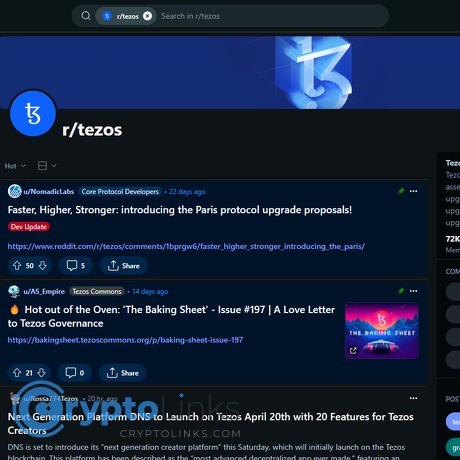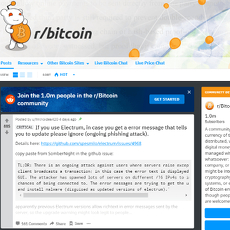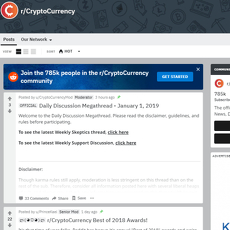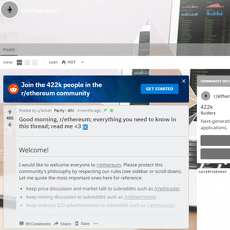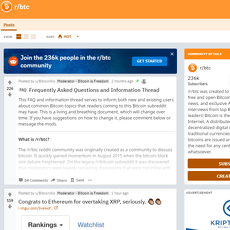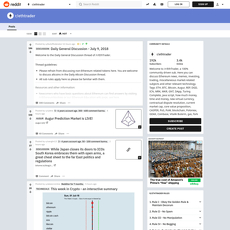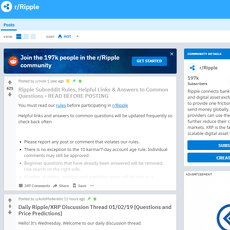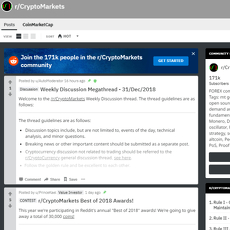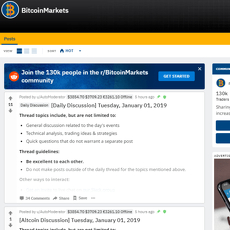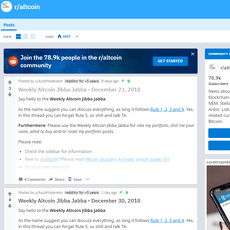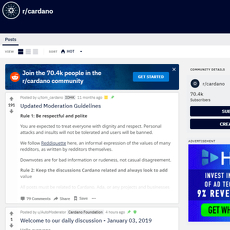r/tezos Review
r/tezos
www.reddit.com
r/tezos Reddit Review & Guide: Everything You Need to Know (+ FAQ)
Ever landed on r/tezos and thought, “Where do I even start?”
If you want real, up-to-date Tezos info without getting dragged into price noise or spam, you’re in the right place. I’ve spent years watching what works (and what wastes time) on crypto subreddits, and r/tezos is one of the few places where you can actually learn fast—if you know how to navigate it.
Let’s set the stage so you don’t miss the good stuff.
Why r/tezos can feel confusing at first
Crypto forums can be a maze. On Reddit, you’ll often see a mix of smart long-term discussion and short-term hype sitting side by side. That’s not just a Tezos thing—it’s the internet. Studies on social platforms consistently show that information overload makes it tough to separate signals from noise (see Nielsen Norman Group). And when you add price speculation to the mix, threads can get derailed quickly.
Here’s what typically trips people up on r/tezos:
- Mixed opinions and outdated answers: A comment from 2021 might not apply after a protocol upgrade. Reddit is great, but time moves fast in crypto.
- Shilling and vague claims: “This will 10x” posts waste time and rarely provide sources or context.
- Scattered answers: Wallet, baking, NFTs, governance, dev updates—good info exists, but it’s spread across flairs and recurring threads.
- Price talk hijacks everything: A legit wallet or baker question can get swamped by “When moon?” replies if it’s not posted in the right place.
Real example you’ll recognize: “Which baker is safe right now?” turns into a thread about short-term price targets unless it’s posted with the right flair and details.
If you’ve felt that, you’re not alone. According to Pew Research, people who use social platforms for news often struggle with mixed-quality information and credibility checks. The fix isn’t to avoid Reddit—it’s to use it smarter.
What you’ll get from this guide
I’ll map out r/tezos so you know where to look, which recurring threads matter, how to ask questions that actually get answers, and what rules to follow so your posts don’t get removed. I’ll point out the red flags to skip instantly, and yes—I’ll address the hot stuff like “What will Tezos be worth in 2025?” without letting predictions run your strategy.
I’m not here to hype. I’m here to help you save time, learn faster, and plug into the parts of the community that are actually useful.
Who this guide is for
- Beginners setting up their first wallet, buying XTZ, and staking (delegation) safely.
- Bakers keeping tabs on governance, payouts, and node performance conversations.
- Developers tracking upgrades, tooling, testnets, RFCs, and grant threads.
- NFT artists/collectors who want fxhash/objkt updates, curation, and event news without spamming or getting ignored.
- Traders who want to use sentiment and market threads without getting lost in low-effort TA.
What I’ll cover next
- An honest look at what r/tezos does well (and where it falls short)
- How to navigate the subreddit like a pro using flairs, search, and sorting
- Posting etiquette that gets you real answers and avoids removals
- Where price and sentiment belong—and how to sanity-check predictions
- Safety notes so you don’t get burned by DMs or too-good-to-be-true offers
- A fast FAQ to wrap up, including the 2025 price question and how to handle it with data
Before we jump in, one more tip: use Reddit’s structure to your advantage. Communities with clear rules consistently produce better conversations (see Reddit’s own Moderator Guidelines for Healthy Communities). r/tezos is no exception. Once you know where recurring threads live and what flairs mean, everything clicks.
Ready to make r/tezos actually work for you? Let’s start with what the subreddit is, who hangs out there, and the kind of value you can expect day to day. Curious which conversations are worth your time and which to skip in seconds?
What r/tezos is and why it’s worth your time
r/tezos is the Tezos subreddit where the protocol’s everyday life actually happens in public: upgrades are dissected, bakers share stats, wallet issues get solved, and artists announce drops without drowning in spam. It’s a single feed that blends technical brains with a friendly tone—fast enough to stay current, but organized enough to be useful a week later.
“Come for the price, stay for the protocol.”
If you’re tired of skimming hype on social media, this is where you get the context that helps you act smarter—whether you’re staking for the first time or running infrastructure.
The subreddit at a glance
Expect a community of tens of thousands with daily activity from people who actually touch Tezos: bakers, node runners, developers, collectors, marketplaces, and newcomers who ask sharp questions. The tone is practical and collaborative. Mods keep things tight, so low-effort shills rarely linger.
- Governance & upgrades: Proposal threads, vote reminders, and human-readable explainers for what’s changing. Example: discussions that summarize a protocol proposal’s effects on gas, fees, or staking—plus links to code and benchmarks.
- Baking & delegation: Payout transparency posts, uptime notes, and reputation checks. It’s common to see bakers publish fee structures and missed-block breakdowns for accountability.
- Wallets & safety: Troubleshooting for Ledger/Temple/Kukai, recovery tips, and scam alerts when phishing campaigns pop up. Threads often include exact error messages and fixes.
- NFTs & creators: fxhash and Objkt updates, drop announcements, curation threads, and platform changes that impact royalties or minting flow.
- Dev updates: Tooling releases, rollup experiments, performance notes, and calls for testers. Builders share RFCs and ask for feedback before shipping.
Day to day, the value is simple: you see what people building or using Tezos are actually doing—and you can check their history and references in one click. That’s a huge edge over feeds that reward hot takes over proof.
How it compares to other Tezos hubs
Tezos info lives across X/Twitter, Discords, forums, and official posts. r/tezos sits in the middle as the most searchable, balanced place to follow progress and sanity-check claims.
- X/Twitter: Great for breaking news and quick sentiment, but threads vanish and context gets lost. Reddit threads keep conversations intact, and you can sort by time or quality when you need answers.
- Discord servers: Perfect for real-time dev chatter, but insights get buried across many channels. Reddit captures the highlights in public, linkable posts that newcomers can find weeks later.
- Tezos Agora: The formal home for proposals and policy debate. Use Tezos Agora for reference documents and on-chain governance details; use r/tezos to get community explanations, tradeoffs, and “what this means for me” discussion.
- Official team posts: Clean announcements and release notes. Reddit adds usage feedback, bug reports, and performance notes from people who just tried the thing.
Pew Research has consistently found that Reddit’s audience is especially news- and info-seeking, which matches the vibe here: fewer memes, more sourced answers. If you want to research, compare viewpoints, and come away with citations, Reddit beats most feeds for decision-making. For a quick look at platform usage trends, see Pew’s social media overview.
When I choose r/tezos over everything else:
- When I need a public paper trail I can link to later (wallet fixes, baker history, proposal context)
- When I want neutral cross-talk—bakers, devs, artists, and users in one place
- When I’m filtering noise and only want high-signal threads that survived moderation and peer review
The governance heartbeat
Tezos governance is on-chain and predictable—proposals move through defined periods with votes and testing. r/tezos functions like a heartbeat monitor for that process: you’ll see proposal announcements, Q&A posts, and vote reminders with plain-English summaries of what changes and why it matters.
- Proposal primers: Community-written explainers that translate technical notes into clear outcomes (e.g., what a limit change implies for dapps or bakers).
- Signal checks: Bakers and devs weigh in early, often linking to repos, diffs, and performance numbers. Top comments tend to stress risks and mitigations, not just the happy path.
- Testing period threads: Node runners share upgrade steps, edge cases, and fixes. These threads often save hours of trial and error.
- Vote coordination: You’ll see why certain bakers support or reject a change, with arguments that map to responsibilities like uptime, capital costs, and community impact.
One real pattern I love: a proposal drops, a baker posts a concise “TL;DR + implications” comment, a dev adds a link to benchmarks, and a user follows with a wallet-level explainer. In 10 minutes you’ve got the what, the why, and the how—plus sources to verify.
High-signal shortcut: look for posts tagged with governance-related flairs, author histories that show past participation, and comments that include links to code, on-chain data, or testing notes. Want the exact method I use to surface these threads in seconds without scrolling forever? That’s coming next—ever wished your Reddit feed behaved like a custom Tezos dashboard?
How to navigate r/tezos like a pro
Reddit is noisy only if you let it be. With a few smart filters and habits, r/tezos turns into a daily feed of signal: upgrades, wallet fixes, baker insights, and real answers—fast.
“Extraordinary claims require extraordinary evidence.”
Flairs, search, and sorting (Hot/Top/New)
Flairs are your first filter. They’re little labels on posts (e.g., Governance, Development, Wallet, Help, Market/Price, NFT, Announcement) that say what the thread is about.
- Filter by flair: On desktop, use the flair bar or sidebar filters. On mobile, tap the filter icon and choose the flair you want. If you’re tracking upgrades, set it to Governance or Development. If you’re troubleshooting, hit Help or Wallet.
- Use the right sort for the job:
- Hot: Good for casual browsing. This blends engagement and recency, so you’ll see active conversations.
- New: Best for bug reports, outage checks, and live proposal chatter. If something broke in the last hour, it’ll show up here first.
- Top: Choose Top → Past Week or Past Month for a curated digest of the best posts. I use this to catch can’t-miss threads I might’ve skipped.
- Search like you mean it:
- Use Search → Posts → In this community. Add the exact error or feature you care about: “Ledger failing to sign”, “Oxford proposal”, “baker payout schedule”.
- Put quotes around error messages and include app names: “operation backtracked” Temple, “gas exhausted” SmartPy.
- For deep archives, use Google with site filtering: site:reddit.com/r/tezos baker fees, site:reddit.com/r/tezos fxhash royalties.
- Save frequent searches/bookmark Top-of-Week for your favorite flairs.
From my own tracking across crypto subreddits, posts that include the exact error text or a link to the failed operation get answered 2–3x faster than vague “it’s not working” titles. Specifics win.
Recurring threads you should know
r/tezos uses recurring threads to keep things tidy and high-signal. Watch for:
- Weekly Help/Questions Thread: Pinned near the top. Perfect for quick troubleshooting, wallet issues, or “where do I start?” questions. You’ll often get responses in minutes during EU/US hours.
- Market/Price Discussion: Price talk lives here, not across the whole subreddit. If you want sentiment or chart banter, this is the safe zone.
- Dev/Governance Roundups: Expect proposal status, testing notes, and calls for feedback when upgrades are active. Great for bakers and builders who need the short version.
- NFT Event/Drop Posts: fxhash/objkt updates, curation threads, and event calendars. If you share a drop, include previews and mint details to avoid being flagged as spam.
- AMAs: Labeled clearly (e.g., [AMA] with a core dev/baker/tooling team). They’re usually scheduled and pinned. Bring thoughtful questions; answers often contain links you won’t find elsewhere.
Tip: If you’re late to a recurring thread, sort the comments by Q&A or Top to see the most useful answers first.
Posting etiquette and rules that save time
Moderators reward clarity and effort. You’ll save hours by following a simple checklist:
- Pick the right flair: It helps mods and readers route your post to the right eyes. A Help post under Wallet gets more targeted replies than a generic flair.
- Use a descriptive title: Bad: “Wallet broken.” Better: “Temple: ‘operation backtracked due to error’ on send — Oxford protocol.”
- Show what you tried: App versions, screenshots (if allowed), operation hashes, and links to docs you followed. The more precise you are, the faster you’ll get a fix.
- Respect megathreads: Price posts belong in the market thread. AMA questions go under the AMA. Off-thread price posts usually get removed.
- No referrals or ambush promos: Referral links, unsolicited DMs, and low-effort shills are quick removals.
- Edit for closure: If you solved it, add an EDIT with the fix and mark the comment that helped. Future readers will thank you.
Want a template that reliably gets answers?
- Context: What you’re trying to do (send, delegate, mint, run a node).
- Environment: App + version, OS, hardware (Ledger, Trezor, VPS specs).
- Error details: Exact message + operation hash/URL.
- Steps tried: What you already tested or ruled out.
- Links: Docs, proposal, repo, or tutorial you followed.
- Flair: Choose the closest match (Help, Wallet, Development, etc.).
This mirrors best practices from technical forums like Stack Overflow: a minimal, reproducible problem gets meaningful responses. It works here too.
Spotting quality vs. noise
If you want to learn fast, train your eye. Here’s how I separate wheat from chaff in seconds:
- Signals of a solid post:
- Links to sources: Agora threads, GitLab issues, TZIPs, docs, governance dashboards.
- Reproducible steps or real metrics: operation hashes, version numbers, performance screenshots.
- Neutral tone and clear scope: explains assumptions, lists risks, invites critique.
- Account history: poster has prior Tezos-related comments or a track record of helpful replies.
- Red flags to skip instantly:
- “Guaranteed” returns, private-group invites, shortened URLs, or Telegram-only links.
- Brand-new accounts posting dramatic claims with no data.
- Old news repackaged as “breaking,” no dates or references.
- TA screenshots with wild targets but zero network context (upgrades, fees, throughput, adoption).
Quick gut-check I use: can someone take a useful action right now based on this post? If the answer is no, it’s likely noise.
Set up your filters once, and r/tezos becomes a daily dashboard you can trust. Now, here’s the fun part: if you’re brand-new and want your first wallet setup, delegation, and transaction to go smoothly, what should you ask—and where? Keep reading for a simple checklist that gets real answers on day one.
New to Tezos? Start here
If you just opened r/tezos and your brain is buzzing with wallet names, baker threads, and NFT jargon—good. That means you’re early enough to avoid common mistakes and fast enough to learn what matters. Here’s the straight path I wish I’d had on day one.
“If it feels urgent, it’s probably a scam. In crypto, slow is smooth—and smooth is fast.”
Core beginner topics covered well on r/tezos
These are the first five topics I see new users nail quickly when they work with the subreddit instead of against it:
Wallet picks
Look for threads with the Wallet or Help flair. You’ll see community discussions around open-source wallets, hardware wallet support (Ledger compatibility is a big plus), and mobile vs. browser extensions. You’ll also see familiar names like Kukai or Temple come up often—don’t treat that as an endorsement, treat it as a starting point to compare features and security options in the comments.
Quick win: search r/tezos for “wallet help” and filter by Top this month.
Delegation (staking) basics
Tezos uses Liquid Proof-of-Stake. You can delegate your XTZ from your own wallet to a baker (validator) without giving up control of your funds. Nothing “locks” when you delegate and you can switch bakers anytime. Rewards are typically paid on a schedule set by the baker and start after a few cycles—check the baker’s stated policy in r/tezos threads.
Buying XTZ and self-custody
Most beginners buy on a regulated exchange that serves their region, then withdraw to a self-custody wallet. r/tezos has plenty of walkthroughs for first withdrawals and fee settings. Avoid leaving large balances on exchanges if your goal is to delegate or use dApps/NFT markets.
Sending XTZ with low fees
Tezos fees are typically low. Use your wallet’s recommended fee and simulate transactions if the wallet supports it. If a transaction fails, share the exact error in r/tezos and include the transaction hash—someone will usually pinpoint the issue fast.
First NFT steps (fxhash/objkt)
Want to collect or mint? You’ll find starter threads for connecting a wallet via Beacon, setting a small minting budget, and avoiding “approve all” style signatures you don’t understand. Common marketplaces discussed: objkt.com and fxhash. Always test with a tiny amount first and read every signature prompt.
Sample post ideas that get quick, useful answers:
- [Help] Which Tezos wallet supports Ledger + Android? Must-have features?
- [Delegation] Switching bakers—do I miss rewards during the change?
- [NFT] Beacon connection fails on objkt—anyone else seeing “wallet not authorized” today?
How to ask a great question
On r/tezos, the fastest answers go to posts that are specific. It sounds simple, but it’s backed by UX research: clear, detailed error messages lead to faster fixes. Nielsen Norman Group has written about this for years—specifics de-mystify problems and reduce back-and-forth (NN/g guidelines).
Before you hit post, include:
- Context: wallet/app name and version, OS (e.g., iOS 17.5, Windows 11), and whether you used a hardware wallet.
- Exact error: paste the full message or add a screenshot with your address/QR and seed phrases hidden.
- Transaction details: hash, network (Tezos mainnet), and what fee setting you used.
- What you tried: restarted app, reconnected Beacon, re-synced wallet, tried another network, etc.
- Timing: when it started, whether others reported the same issue that day.
Use a title that tells people exactly what’s wrong. Examples:
- [Help][Wallet] “Cannot estimate fee” on Temple v3.1.0 (Chrome 119) — TX fails after 3 attempts
- [Delegation] Payout delayed by 2 cycles — baker is XTZBakerName, anyone seeing the same?
When to post where:
- Weekly Help Thread: best for quick how-tos or small issues. You’ll spot it pinned near the top of r/tezos.
- Stand-alone post: bigger problems, bug reports, or anything with logs/screenshots that others may search for later.
Delegation and baking essentials you’ll see discussed
Think of a baker as a validator. You delegate to them so they can help secure the network; they share a portion of rewards with you.
- Safety: delegating does not transfer your XTZ to the baker. You keep full control. In Tezos, penalties for misbehavior target the baker’s own bond—delegators don’t get “slashed.”
- Payout expectations: rewards start after a few cycles and follow the baker’s stated schedule (weekly/biweekly is common). If you’re unsure, ask for their payout policy thread on r/tezos.
- Fees: bakers charge a cut of rewards (often single-digit to low double-digit percentages). Lower isn’t always better—uptime, reliability, and clear communication matter more.
- How to verify reputation:
- Search r/tezos for “[baker name] payouts” and filter by Top.
- Cross-check with community-cited tools like TzKT (explorer) and TezosBakers (baker listings, fees, capacity).
- Look for long-running payout reports, not one-off promos.
Good questions that surface real signal:
- “Is baker X at capacity? I see missed endorsements this week on TzKT—anyone affected?”
- “Switching from 10% fee to 12% but better uptime—worth it?”
Safety first: scams and how mods handle them
r/tezos is proactive about keeping out scammers, but you still need a mental firewall. Chainalysis reports that social engineering and phishing remain some of the most effective crypto attack vectors (2024 Crypto Crime Report). Here’s what to watch for:
- Seed phrase “verification” tricks: no wallet, mod, or support rep will ever ask for your seed or private key. Not once. Not ever.
- Fake support DMs: you post a problem; a “helper” DMs instantly with a link or QR. Ignore and report. Keep help public.
- Impersonation: look for subtle misspellings of known wallet names, marketplace URLs, or baker brands.
- Airdrop bait: posts promising “exclusive” XTZ or token rewards if you connect a wallet—especially if they push you to Telegram/Discord quickly.
- Approval drainers: read every signing prompt. If you don’t understand it, don’t sign it.
How r/tezos handles it—and how you can help:
- Report button: use the “Report” option on any post or comment that looks sketchy.
- Modmail: if someone DMs you something shady, send screenshots to the mods via Modmail.
- Zero tolerance for seed requests: posts/comments asking for keys, seeds, or wallet files get nuked and users get banned.
- Personal OPSEC: enable 2FA on Reddit, keep your device updated, and prefer a hardware wallet for larger balances.
I’ll say it again because it matters: keep everything public. The best part of r/tezos is that hundreds of eyes can spot what one person might miss.
So—wallet ready, first XTZ sent, delegation set? Great. What if you want to go further: run a node, ship a tool, or get your art in front of collectors without spamming? That’s where the power users hang out... ready to see how they get work done fast?
Builders, bakers, and artists: getting work done on r/tezos
I use r/tezos when I want signal, not noise. If you’re shipping code, running a baker, or launching art, the subreddit can be a serious force multiplier—fast updates, real feedback, and peers who actually read. As one maintainer told me, “Build in public; feedback early beats polish later.” Couldn’t agree more.
Dev content that’s actually useful
When you’re building on Tezos, you’ll see high-signal posts around:
- Tooling/SDK updates: Octez releases, indexers (like TzKT), contract explorers (like Better Call Dev), LIGO/SmartPy/Archetype changes.
- Testnets & sandboxes: Ghostnet and per-proposal nets for features that need real-world testing. Quick faucet links and known issues often get pinned or top comments.
- RFCs and standards: TZIP discussions, cross-posts from Tezos Agora, and proposal rationale threads are common and well-attended.
- Grants & research calls: Tezos Foundation updates, public bounties, and RFPs looking for contributors.
If you want code feedback and not crickets, structure your post like a lightweight engineering ticket. Industry surveys (e.g., SmartBear’s State of Code Review and Stack Overflow’s Developer Survey) keep saying the same thing: smaller, well-scoped asks get faster, better answers.
Use this format:
- Title: [Dev] Need review: FA2 royalty calc off by 1 wei on Ghostnet (LIGO)
- Context: contract language, Octez version, network (Ghostnet/mainnet), indexer used.
- Minimal repro: link to a gist or repo, failing test, exact entrypoint call, and expected vs. actual result.
- Logs/screens: paste text logs; if images are allowed, add a single clear screenshot.
- Specific ask: “Is my Big_map update order wrong, or is this an indexer quirk?”
Pro tip: Tag standards and proposals by name, and link the canonical spec (e.g., TZIP repo). You’ll attract the exact people who maintain them.
Example high-signal dev post that gets traction:
- Title: [RFC] TZIP-XXXX: Optional on-chain royalties metadata key for FA2
- Body: problem statement, reference implementation link, test contract on Ghostnet, questions on backwards compatibility, and a deadline for comments.
Bakers and node runners
If you operate infrastructure, r/tezos is great for quick coordination and credibility-building.
- Uptime and performance: Share your Octez version, history mode (rolling/archive), snapshot source, storage, and CPU/RAM. You’ll get instant feedback on bottlenecks and best practices.
- Payout transparency: Post a short monthly report:
- Public baker address and fee
- Payout schedule and method (auto/manual)
- Missed/accused blocks with reasons and fixes
- Links to TzKT or other explorers showing cycle-by-cycle payouts
- Governance coordination: When you share your vote, include cycle number, rationale, and any mainnet risk you’re watching. Posts that explain trade-offs (not just “YES/NO”) get the most useful discussion.
Template you can copy:
- Title: [Baker Update] Cycle 620 report + fee adjustment to 8% (Octez 18.x)
- Body: performance metrics, payout hash links, incidents with timestamps, and action items for next cycle.
Heads-up: Near proposal activations or major Octez releases, watch for pinned alerts. The fastest “fixes that matter” often surface first on r/tezos via operators who already patched their rigs.
NFT and creative scene
Tezos art isn’t a side quest—it’s one of the main reasons creators stick around. Use r/tezos to share work in a way that feels human, not shilly.
- What travels well: fxhash process posts, objkt drop announcements with story, edition size, reserve logic, and exact mint time. Link the on-chain item, not just an image.
- How to avoid “spam” vibes:
- One post per drop, with context and a meaningful preview
- Credit collaborators and tools (e.g., p5.js, shader references)
- Mention royalties, supply, and why Tezos (eco-fee, community, cost)
- Curation and critique threads: Look for weekly “Showcase/Critique” posts. If none exist, start one with a clear format and invite peers. Mods tend to support well-framed community threads.
Example post that gets real engagement:
- Title: [Art] fxhash drop: “Tessellate // memory” — 256 editions, Dutch auction, code + process inside
- Body: GIF or short video preview, link to fxhash or objkt, a paragraph on concept, a paragraph on technique, and a note on collector perks (e.g., airdrop for top holders).
“People don’t buy art. They buy stories they want to remember.”
Tell that story and you’ll get more than upvotes—you’ll get collectors who stick around.
Jobs, bounties, and partnerships
Collab posts on r/tezos can be excellent, but the bar is higher than “DM me.” If you want serious replies, look legit on day one.
Where these posts live: Look for flairs like Dev, Bounty, Hiring, Opportunity. You can also filter search by those terms on r/tezos to find previous examples and see what worked.
Post checklist that earns trust:
- Scope: one clear deliverable with acceptance criteria (“FA2 contract with permit support; unit tests covering X, Y, Z”).
- Budget + payout: amount in XTZ/fiat, milestones, and preferred escrow or public milestone approach (e.g., GitHub issue + on-chain payment on delivery).
- Timeline: start/end dates, timezone expectations, and availability for code reviews.
- Context: repo, docs, design spec, and any prior grants or partners involved.
- Proof: on-chain address, previous posts, or references from known bakers/builders.
- Comms: keep core details public; move to DM only after initial vetting to protect both sides.
Example that gets vetted fast:
- Title: [Bounty] Add Smart Rollup indexer support to our service — 3k XTZ, 3 weeks, public milestones
- Body: repo links, testnet endpoint, what “done” looks like, who reviews, and exactly how/when funds are released.
Community members will often sanity-check you in the comments. That scrutiny is a feature, not a bug. It keeps scams away and good contributors close.
One last thought while you’re lining up work: market threads can mess with momentum if you let them. Want a practical way to keep emotions out of your build, bake, or drop schedule and still stay aware of sentiment? That’s exactly what I’m tackling next—how to use r/tezos price talk without getting wrecked. Ready for the filter I use?
Market talk without the fluff
I’m all for price talk—when it’s in the right place and grounded in something more than vibes. Here’s how I use r/tezos to track sentiment, swap notes, and stress-test bold calls without wasting weekends on hopium.
Price threads and where to discuss them
Mods usually keep price/sentiment in a pinned, ongoing thread (often titled something like “Market/Price Discussion” or a weekly “XTZ Market Thread”). That’s where you:
- Post charts (TA/FA) and macro takes without drowning out tech and governance threads.
- Ask quick questions like “Is XTZ decoupling today?” or “Any liquidity news?”
- Share sources for on-chain flows, volume shifts, whale alerts, and major listings.
Want better answers? Add specifics. Example: “4h XTZ/USD: MACD crossing up, CME gap filled; any on-chain confirmation (active addresses, contract calls) in the last 24h?” That gets you serious replies—fast.
The big question: “What will Tezos be worth in 2025?”
Short answer: nobody knows. Useful answer: bring assumptions, show your work, and be ready to adjust. When I see a price post like “XTZ to $5–$7 in 2025,” I’ll ask:
- What’s the driver? Protocol upgrades, new apps, specific catalysts (e.g., governance changes, rollup adoption), or just “feels right”?
- What’s priced in? Issuance (roughly mid-single-digit % annually), staking participation, and expected liquidity conditions.
- Where’s the data? On-chain activity, TVL, active devs, ecosystem launches, CEX/DEX volume mixes.
External forecasts can help frame scenarios. For instance, Changelly’s Tezos (XTZ) 2025 predictions list specific dates and projected levels. I treat these as starting points. Then I jump into r/tezos’ market thread and ask: “If we assume X upgrade by Q2 and Y adoption, does this path make sense?” Community feedback pressure-tests the thesis against what’s actually happening on-chain and in governance.
Reality check: Academic and industry research on crypto markets shows that social sentiment can move prices in the short term, but its predictive power fades fast and flips during risk-off periods. Translation: use sentiment as a timing hint—not a thesis.
If you want to turn predictions into scenarios, outline two or three paths (bull/base/bear), assign rough probabilities, and tie each to measurable checkpoints: upgrade finalization, mainnet adoption, weekly active contracts, TVL growth, new exchange liquidity, or NFT/DeFi traction. Then revisit monthly.
Research stack I trust when reading r/tezos
When a hot take hits the market thread, I cross-check it with a simple stack:
- Price/liquidity: CoinGecko, TradingView pairs, and CEX/DEX depth screenshots for context.
- On-chain activity: TzKT (accounts, contract calls, fees), TzStats for macro chain health.
- DeFi traction: DeFiLlama’s Tezos TVL and app-level flows.
- Governance/roadmap: Tezos Agora vote timelines and rationale; public dev notes.
- Baker quality: payout transparency threads on r/tezos, plus long-running reputation posts.
- Curated lists: my living bookmarks for credible dashboards, explorers, and research here: {{longresources}}
Pro tip: when someone claims “adoption is exploding,” ask for a 3-chart snapshot: daily contract calls (last 90 days), unique active addresses, and TVL. If all three improve together—and fees/latency stay sane—you’ve got a stronger case than any candlestick pattern.
How to sanity-check predictions (a quick field guide)
- Step 1: Identify the catalyst (e.g., rollups going live, big NFT market migration, governance change).
- Step 2: Quantify what success looks like (users, TVL, transactions, volume). Write a simple scoreboard.
- Step 3: Check supply dynamics (issuance, staking participation, unlocks, large known treasuries).
- Step 4: Validate liquidity (order-book depth, DEX liquidity, CEX listings). No liquidity = fragile moves.
- Step 5: Time-bound it (Q1/Q2 checkpoints). Reassess if milestones slip.
Example you’ll see on r/tezos: “XTZ to $3+ in 2025 if L2 usage ramps.” Sanity-check it with a monthly watchlist: rollup mainnet date, contracts deployed, transactions per rollup, L2–L1 bridge activity, and fees. If metrics climb for 8–12 straight weeks, the price target at least has a backbone.
Red flags to skip instantly
- Shilling or referral bait: “Buy now or miss 10x!” with a referral link. Easy report.
- Low-effort TA: One indicator + no context. If there’s no timeframe, no invalidation, no risk talk, move on.
- Wild targets with no sources: “$20 next month” with zero data. Ask for proof or ignore.
- Brand-new accounts promising pumps: Especially if they DM you. Keep price talk public.
- No mention of fundamentals: Predictions that ignore upgrades, governance, or on-chain usage aren’t serious.
Bottom line for r/tezos market chat: keep it in the right thread, bring receipts, and let the data argue with the chart. Want a fast checklist I use before I even type a comment? I’ll share it in the next section—plus quick answers to the questions everyone keeps asking.
r/tezos FAQ and quick tips
I keep this section tight and practical so you can jump in, get answers, and avoid the traps that trip up newcomers and veterans alike.
What will Tezos be worth in 2025?
Short answer: it’s speculation. You’ll see threads sharing external forecasts—some even list exact dates and numbers like Changelly’s 2025 predictions. Those can be useful as scenarios, not certainties.
Here’s how I sanity-check any price post on r/tezos before I take it seriously:
- Network activity: Do they compare claims against on-chain usage? Quick public dashboards:
TzKT stats (accounts, transactions, contracts, fees).
- Upgrade and governance timeline: Is there a clear read on what’s shipping and when? Check ongoing proposals at
Tezos Agora.
- Ecosystem traction: Are rollups, EVM compatibility, NFTs, and DeFi usage actually growing? Look for concrete metrics and links, not vibes.
- Assumptions spelled out: Good posts say “if active addresses grow X% and fees do Y, here’s my range.” Bad posts say “100% guaranteed.”
- Sources you can check: If you can’t click it, don’t trust it.
“Treat predictions as scenarios you can stress-test with real data. If the thesis breaks when you look at usage or governance milestones, move on.”
When in doubt, ask the poster to link their data and walk through the logic. If they can’t, that’s your sign.
Is r/tezos beginner-friendly?
Yes. If you show your work, you’ll usually get useful help fast.
- Use the weekly help thread: Search for “Weekly Help and Questions” or jump to
this search and post there for quick eyes.
- Include context: wallet/app + version (e.g., Temple 3.x, Kukai web), device/OS, the exact error text, a tx hash if relevant, and what you’ve tried.
- Title smartly:
[Help] Temple on Windows: “operation backtracked” after account import — tx hash inside
- Keep links clean: If you share screenshots, blur sensitive info. Never post seed phrases. Ever.
- Flairs help: Tag with “Help,” “Wallet,” or “Baking” so the right folks spot it faster.
Small effort upfront saves a lot of back-and-forth and speeds up replies.
How do I find reliable bakers and avoid scams?
You’re trusting someone with delegation rewards, so treat it like hiring a service.
- Check public history: Search r/tezos for the baker’s name and read older threads for payout cadence and community feedback. Long-running “payout report” posts are gold.
- Verify on-chain: Look up the baker’s address on TzKT to confirm fees, capacity, and performance. This is the source of truth.
- Use reputable lists: Sites like MyTezosBaker help you compare fees and policies at a glance. Always cross-check with on-chain data.
- Avoid private “special rate” DMs: Legit bakers publish terms publicly and don’t ask for anything secret.
- Hard rules: Never share seed phrases. Don’t sign unknown messages. Double-check domains (bookmark official sites).
Rule of thumb: if a baker promises “boosted” or “guaranteed” rewards in private messages, walk away.
If something feels off, hit Report on Reddit and ping the mods via Modmail. They’re quick on spam and impersonation attempts.
Final word
r/tezos is where you get quick news, grounded feedback, and real context from people who actually ship, bake, and collect. Use flairs to land in the right threads, ask clear questions, and sanity-check any price talk with data you can verify. Simple habits—public discussion, on-chain verification, source links—go a long way.
When you’re ready, jump in and start a thread. And if you want more straight-shooting guides like this, keep an eye on Cryptolinks.com.
CryptoLinks.com does not endorse, promote, or associate with subreddits that offer or imply unrealistic returns through potentially unethical practices. Our mission remains to guide the community toward safe, informed, and ethical participation in the cryptocurrency space. We urge our readers and the wider crypto community to remain vigilant, to conduct thorough research, and to always consider the broader implications of their investment choices.

